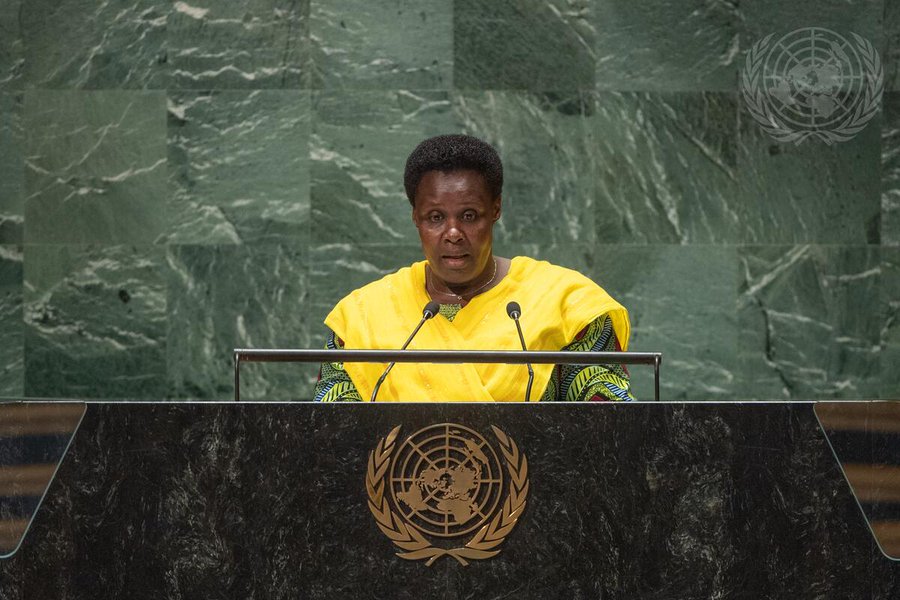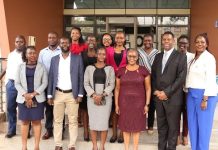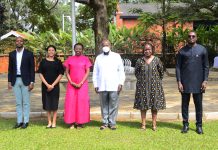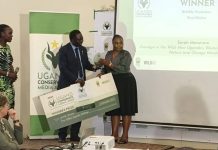In the address to the UN General Assembly, Uganda’s Vice President, Jessica Alupo underscores the nation’s unwavering commitment to a revitalized United Nations, multilateralism, and the imperative of UN reform. Highlighting Uganda’s dedication to the 2030 Agenda for Sustainable Development, peace, security, and climate action, the Vice President urges international support. She expresses concerns about the repercussions of COVID-19 on healthcare and economies. Furthermore, the she reaffirms Uganda’s role as the incoming Chair of the Non-Aligned Movement and host of the 19th NAM Summit. She underscores the importance of South-South cooperation and extends a warm invitation to global leaders for forthcoming summits in Uganda.
Here is the address in detail;
“
President of the UN General Assembly;
Excellencies, Heads of State and Government;
Secretary-General of United Nations;
Distinguished delegates;
Ladies and Gentlemen.
Mr. president,
I congratulate you on your election as President of the 78 th Session of the UN General Assembly and assure you of Uganda’s full support. I would like to thank H.E. Mr. Csaba K6rösi for his stewardship of the 77th Session. I pay tribute to the Secretary-General, H.E. Antönio Guterres, for his leadership and commitment to the work of the
United Nations.
Mr. president,
As we mark seventy-eight years of the existence of the United Nations, we yearn for a revitalized organization, capable of addressing current and emerging global challenges. We believe that multilateralism remains a fundamental and crucial mechanism for addressing our common challenges together as nations in solidarity.
We pledge to work together with the entire membership of the United Nations towards making our organization fit for purpose and relevant for our times.
In this regard, Uganda remains committed to the reform of the United Nations Security Council to make it more representative and to address the historical injustices committed against the people of Africa as spelt out by the Common African Position and enshrined in the Ezulwini Consensus and Sirte Declaration.
Mr. president,
Uganda acknowledges that timely and full implementation of the 2030 Agenda for Sustainable Development is critical for the achievement of the 17 Sustainable Development Goals (SDGs). In this regard, the Government has continued to take bold actions to accelerate the implementation of the 2030 Agenda nationally. Notable actions include the operationalisation of Voluntary Local Reviews and institution of the national Sustainable Development Goals Conference held annually with the participation of all stakeholders to discuss the progress so far achieved and agree on actions to ensure full compliance. Nationally, we continue to register steady progress in the implementation of the 2030 Agenda whose progress shall be contained in the third Voluntary National Review report, to be presented during the High-Level Political Forum under the auspices of the UN Economic and Social Council in July 2024.
Mr. president,
Peace and security is fundamental and crucial in achieving sustainable development. Therefore, we need to reflect on the original purposes of the United Nations and work to resolve man made conflicts and global insecurity through cooperation, diplomacy and peaceful means. In this regard, Uganda has continued to work with partners to support and advance peace, stability and security initiatives in the region and beyond so as to eliminate terrorism, mistrust and other conditions that undermine development. We remain actively involved in regional initiatives, particularly those under the African Union (AU), the Intergovernmental Authority on Development (IGAD), East African Community (EAC), International Conference on the Great Lakes Region (ICGLR). Our involvement is based on the fundamental values of multilateralism. As the international community, we must be steadfast in our resolve to support dialogue and the peaceful resolution of conflicts wherever they occur around the world.
Mr. president,
Uganda has been at the forefront of receiving large numbers of refugees from within the region and ranks as one of the top refugee hosting countries. Uganda extends her gratitude to the UN, Member States and other development partners for the support and assistance rendered to the country and refugees respectively. We are working closely with the UN and partners to address the root cause of displacement.
Uganda remains committed to shoulder its responsibilities and obligations in addressing the plight of refugees as a pioneer of the progressive refuge policy outlined in the Comprehensive Refugee
Response Framework. As one of the co-convenors of the Global Refugee Forum, we commend all States and other actors for their sustained commitment over the last three years and we call upon Member States and stakeholders to continue their commitment to pledge towards initiatives that advance the principle of burden and responsibility sharing, central to the compact during the forthcoming
Global Refugee Forum.
Mr. president,
The Constitution of Uganda provides for protection of the rights and freedoms of all Ugandans as well as for the promotion of culture. Uganda has institutional safeguards which address grievances of human rights abuses. Objective 24 of the Constitution states that cultural and customary values are consistent with the fundamental human rights and freedoms, human dignity, and democracy. Our approach to human rights is to respect other people’s values and we expect others to respect our values which are deep rooted in our culture. We therefore call for mutual respect of sovereignty. We believe that Human Rights Considerations especially in the face of varying cultural values, should not become the moderating factor in our long-term relationship with our development partners with whom we will continue to engage in a proactive manner.
Mr. president,
Regarding Gender Equality, over 34.9% of the parliamentary and executive seats are composed of women. On Economic empowerment, Uganda has embarked on poverty alleviation programmes which target women and youth participation in the economy. We are currently promoting value addition, value chain and public procurement from the various Uganda Women Entrepreneurship programmes. With the creation of the Africa Continental Free Trade Area (AfCFTA), women will participate in cross border trade within the AfCFTA countries. However, work still needs to be done in Uganda to achieve full gender equality.
Mr. president,
Climate change continues to undermine the ability of all nations to achieve the sustainable development goals. Globally, we continue to witness climate and weather extremes causing considerable loss of lives and property. We remain concerned that countries that are less contributors to the global greenhouse gases continue to be disproportionately affected by the impacts of climate change. In this regard my country extends its sincere condolences to the people of Morrocco, following the devastating 6.8 magnitude earthquake which claimed more than 800 lives, and the people of Libya following the aftermath of Storm Daniel that resulted in unprecedented flooding and loss of lives.
To address the adverse impacts of climate change, Uganda continues to take bold climate adaptation and mitigation measures, that include increasing access to affordable, reliable, sustainable, and modern to enhance production and value addition; increasing forest and wetland cover and championing the operationalization of climate smart agriculture among others, in line with our ambitious updated Nationally Determined Contributions. However, we note that the lack of sufficient means of implementation continues to undermine our efforts to adequately address the impacts of climate change.
We thus reiterate our call to the developed country parties in line with the Paris Agreement to fulfill their commitment of providing the USD 100 billion annually to developing country parties through 2025 to assist with respect to both mitigation and adaptation.
Mr. President,
We remain deeply concerned about the increasing trend in biodiversity loss. We believe that the full and timely implementation of the decisions adopted at the fifteenth meeting of the Conference of Parties to the Convention on Biological Diversity are fundamental to effectively address biodiversity loss. In this context, Government of Uganda has continued to take bold actions to address biodiversity loss. These actions include, among others, complete restoration of all degraded wetlands, re-afforestation, as well as prosecution of those involved in illegal activities that undermine the preservation of flora
and fauna. Our view is that conservation and sustainable use of biodiversity remains a commitment for all nations and humankind. We, therefore, urge the international community to provide developing countries with sufficient means of implementation in terms of financing, capacity building and technological transfer to support their efforts to address the challenge of biodiversity loss.
Mr. president,
Developing countries continue to face unprecedented financing challenges, which undermine their ability to achieve sustainable development. We believe that the urgent need to reform the international financial architecture is fundamental and crucial in addressing these challenges. These reforms must be substantial to ensure that developing countries are well represented to effectively and efficiently participate in the decision making of these international financial institutions. Our view is that these international financial institutions should support developing countries in their development efforts in accordance with their national policies and legal frameworks.
Mr. president,
The COVID-19 pandemic presented a multitude of challenges to global health systems and essential health services. This crisis not only reversed hard-fought health gains, but has also inflicted severe economic hardships, especially in developing countries like Uganda. We have witnessed widespread job losses, disruptions in supply chains, decreased foreign investments, and increased poverty rates. These economic setbacks further exacerbate the already existing challenges towards meeting the 2030 Agenda. In Uganda for instance, despite earlier progress, access to universal healthcare today stands at 65% which is well short of the SDG target of 100%.
This crisis, while daunting, also presents opportunities for us to rethink and reinforce our commitment to healthcare and the Sustainable Development Goals. Despite the challenges, I am happy to report that Uganda has registered positive achievements in some effective disease control measures, as demonstrated by its swift and successful response to the Ebola outbreak. Through diligent efforts and the collaboration of healthcare professionals and the government, Uganda declared the end of the Ebola outbreak caused by Sudan ebolavirus on 11 January 2023, just four months after the first case was confirmed in September 2022. This accomplishment underscores the importance of surveillance, contact tracing, and infection prevention and control in swiftly mitigating public health crises. By working together and capitalizing on expertise and infrastructure developed in these areas, we can collectively contribute to a healthier, more resilient world.
Mr. president,
The Non-Aligned Movement (NAM) remains a key player in handling current and emerging global challenges within the United Nations.
The Movement remains relevant in serving the interests of its Member States, in line with its founding principles and purposes. In this regard, Uganda as the incoming Chair of NAM will closely work with other NAM countries to further strengthen the tenets and values of the Organisation and the important role that the Movement plays within the United Nations and other international fora. As host of the 19th NAM Summit, we look forward to welcoming the NAM Heads of State and Government to Kampala, Uganda from 15th– 20th January
2024.
Finally Mr. president,
South-South Cooperation remains a strong element of international cooperation within the countries of the global south, which must be enhanced. We continue to witness the solidarity exhibited by countries in the global south to extend support to their global counterparts to address the multiple challenges. We therefore commend these countries for this solidarity. Uganda will continue to support the strengthening of South-South Cooperation and Triangular Cooperation as well as North-South Cooperation within the United Nations. As the Third South Summit host, we look forward to welcoming the leaders of G77 plus China to Kampala, Uganda, from 21 st — 23 rd January 2024.
I thank you for your attention.
“























